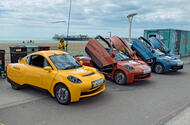Coventry University Design Students Collaborate with Riversimple to Create New British Supercar

Autocar and Riversimple, the leading manufacturer of hydrogen-electric road cars in the UK, have joined forces to launch a competition for automotive students at Coventry University. The aim of the competition is to design a groundbreaking supercar that may potentially be produced by Riversimple.
Design Requirements
The brief for the competition specifies that the supercars must have a simple and elegant design, with a hydrogen fuel cell located at the front and the electronics and batteries at the rear. The size of the car should be similar to a Ferrari Dino 246 GT, with an overall length of approximately 4.2 meters, a width of 1.7 meters, and a height of 1.1 meters. The supercars will utilize the same 70kg carbonfibre chassis as Riversimple’s Rasa, which weighs 655kg. The weight of the new supercar should not exceed 620kg.
Performance and Features
The lightweight construction, combined with the fuel cell’s power output of up to 270bhp through four compact inboard motors, is expected to result in a 0-62mph sprint time of 3.5 seconds and a 0-100mph time of 6.2 seconds. The top speed will be limited to approximately 100mph. The tires will be 185/40×17, as the car’s light weight does not require larger tires. The weight distribution of the car is biased more than 50% towards the rear.
Opportunity for Students
Riversimple CEO Hugo Spowers acknowledges that these requirements pose a challenge for the students, but the potential reward is significant. He stated, “Most design competitions are theoretical, but this one’s real. If our entrants come up with designs we think could work, we might well adopt them for production.”
Judging and Production
The entries will be evaluated by Andreas Mindt, Volkswagen’s design boss, later this year. Mindt himself participated in a similar competition supported by Autocar when he was a student in 1992. The timeline for production has not been determined yet, but if the necessary funding of approximately £5 million is secured, the supercar could be on the roads within three years. Spowers mentioned that the car will not be inexpensive due to its rarity and sophistication.

